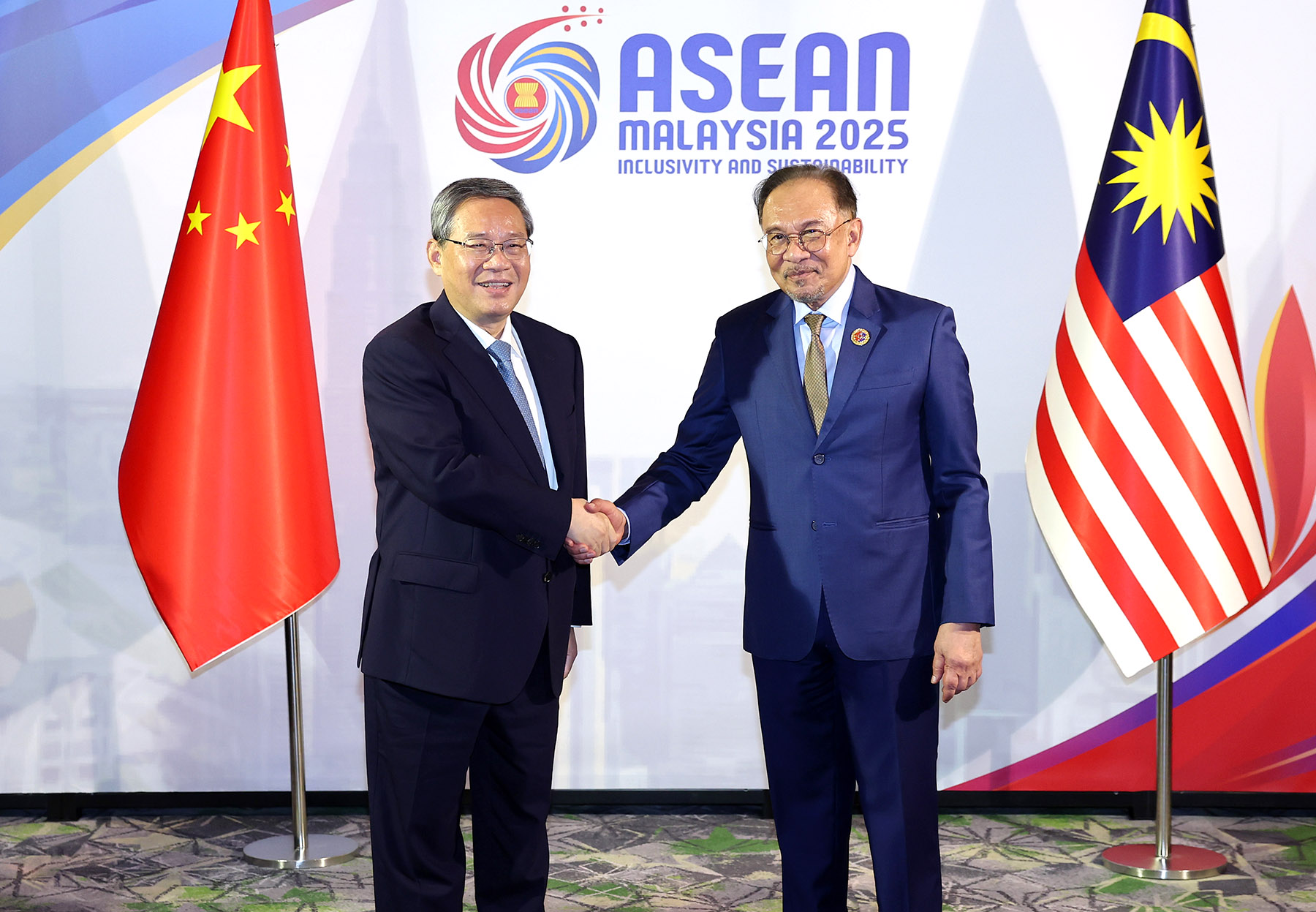Cross-regional meeting expected to enhance solidarity, multilateralism

Premier Li Qiang arrived in Kuala Lumpur, Malaysia, on Monday, as the Association of Southeast Asian Nations, the Gulf Cooperation Council and China will hold an inaugural summit for trilateral cooperation that observers said will give new momentum to Global South cooperation.
The three parties now have more incentive than ever to coordinate in the current geopolitical climate in the face of the United States' practice of protectionism, experts said.
In his Monday meeting with Sheikh Sabah Al-Khaled Al-Hamad Al-Sabah, crown prince of Kuwait, Li said that China looks forward to strengthening communication and cooperation with GCC countries and ASEAN member states, in order to promote peace, prosperity and stability in Asia and make positive contributions to upholding the interests of the Global South.
READ MORE: ASEAN-China-GCC ties seen to inject certainty into global economy
Li said the ASEAN-GCC-China Summit is an opportunity to that end.
Foreign Ministry spokeswoman Mao Ning said at a regular news briefing last week that China supports Malaysia, ASEAN's rotating chair this year, in proposing and hosting the ASEAN-GCC-China Summit.
"Given the current international and regional landscape, it is highly significant that the three sides are gathering together to discuss ways to enhance solidarity and cooperation for development and prosperity, and promote cross-regional cooperation of mutual benefit," Mao said.
Xu Liping, director of the Chinese Academy of Social Sciences' Center for Southeast Asian Studies, said the summit is expected to provide more stability and certainty for the global economy at a time when the International Monetary Fund has significantly downgraded its global growth forecast in 2025 to 2.8 percent citing a "major negative shock" from the new tariffs imposed by the US.
"Such cross-regional cooperation fully demonstrates the unstoppable trend of upholding multilateralism and reflects the intrinsic drive for trade and investment liberalization and facilitation," Xu said.
While China is the world's second-largest economy, ASEAN, a group of 10 Southeast Asian countries — Brunei, Cambodia, Indonesia, Laos, Malaysia, Myanmar, the Philippines, Singapore, Thailand and Vietnam — is the fifth-largest one after the US, China, the EU and Japan.
Meanwhile, the GCC economies, comprising Bahrain, Kuwait, Oman, Qatar, Saudi Arabia and the United Arab Emirates, are expected to double their economic growth rate from 2.1 percent in 2024 to 4.2 percent in 2025, according to a report released in February by the First Abu Dhabi Bank, the largest bank in the UAE.
Julia Roknifard, a senior lecturer at the School of Law and Governance at Taylor's University in Malaysia, said the convergence of major energy exporters in the GCC, ASEAN's large consumer base and China's massive market of over 1.4 billion people offers significant benefits for all parties.
"Together, they hold enough resources within their borders to sustain trade to weather potential restrictions or disruptions," she wrote in a recent column.
According to Xu, from CASS, although China-ASEAN and China-GCC cooperation are quite close respectively, and ASEAN and the GCC held their first summit in Riyadh, Saudi Arabia, in 2023, a trilateral cooperation mechanism is still absent.
"The upcoming summit will be a significant addition to the existing cooperation mechanisms. By effectively eliminating information gaps and reducing communication costs in policymaking, the three parties will be able to achieve 'resonance' in industrial and economic policies and voice a collective call on international issues of common concern," he said.
The trilateral meeting will also become another milestone event in Global South cooperation, as the summit is expected to attract the participation of more countries and international organizations in the future, Xu added.
ALSO READ: China, ASEAN trade to benefit from deal
Prior to the Chinese premier's arrival in Malaysia, he made an official visit to Indonesia, where he held talks with Indonesian President Prabowo Subianto and met with Puan Maharani, speaker of Indonesia's House of Representatives.
When addressing a symposium for Chinese enterprises in Jakarta on Sunday, Li said that China has made full preparations for external shocks and the country has the confidence and the capability to sustain the positive momentum of economic performance.
Noting that it is not easy for Chinese enterprises to operate overseas, Li said that China will continue to strengthen economic and trade cooperation with more countries, create a favorable environment for the overseas development of Chinese enterprises, and provide more opportunities and support, including stronger policy backing.
Xinhua contributed to this story.
Contact the writer at mojingxi@chinadaily.com.cn


